Monday Feb 23, 2026
Monday Feb 23, 2026
Thursday, 14 July 2022 00:00 - - {{hitsCtrl.values.hits}}
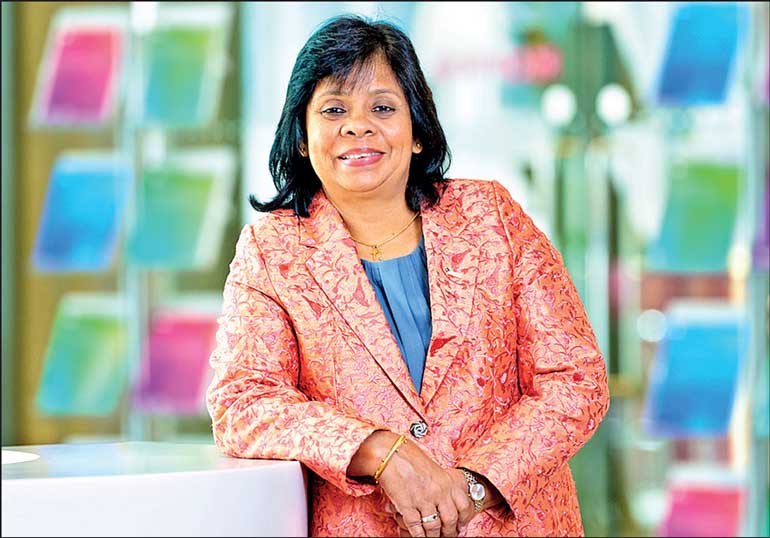
Melanie Kanaka - Photo credit: Fiona Hanson (AP)
In an exclusive interview with Daily FT, Melanie Kanaka, the first Asian woman elected as the President of the Chartered Institute of Management Accountants (CIMA) and Co-Chair of the Association of International Certified Professional Accountants (the Association), which represents the combined membership of CIMA and the American Institute of CPAs (AICPA), elucidates on her vision of ‘becoming a trusted partner, inspiring younger generations to join the profession, and championing diversity, equality and inclusion.’
The 89th President to take the reins of CIMA, Kanaka has extensive experience in corporate finance and development banking across the USA, Germany and South Asia. She also leads the finance and administration function for the World Bank in Sri Lanka and Maldives where she is responsible for finance, resource management and performance review and is part of the World Bank’s South Asia regional unit. The trendsetting Sri Lankan Kanaka is, she also calls for investing in skills to help generate economic growth and help Sri Lanka overcome current challenges. Following are the excerpts:
By Randima Attygalle
Q: Your appointment as the first Asian woman to head CIMA comes at a decisive juncture of Sri Lankan history. In these turbulent times braved by the country, how do you think your appointment reflects positively on our nation?
A: As the first-ever Asian woman to be elected President of the Chartered Institute of Management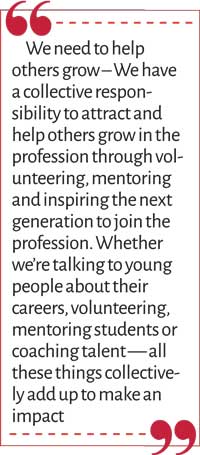 Accountants (CIMA) and Co-Chair of the Association of International Certified Professional Accountants (the Association), the body that represents both CIMA and the American Institute of CPAs and nearly 700,000 members and students around the world, my election marks an important milestone in the history of CIMA, the Association as well as Sri Lanka.
Accountants (CIMA) and Co-Chair of the Association of International Certified Professional Accountants (the Association), the body that represents both CIMA and the American Institute of CPAs and nearly 700,000 members and students around the world, my election marks an important milestone in the history of CIMA, the Association as well as Sri Lanka.
Sri Lanka hosts the second largest CIMA community of management accountants, right behind the UK and I believe that my election shows that Sri Lanka still has a lot to offer to the world. Not just when it comes to accounting and finance, but also in areas such as trade, agriculture and education. We’re an incredibly resilient nation, and have what it takes to get through these challenging times.
Q: When you look back at your eventful professional journey, how do you feel?
A: My career spans over 30 years and I’m extremely proud of everything I’ve achieved so far. It has taken a lot of hard work and commitment throughout the years.
My recent election as 89th President of CIMA and Co-Chair of the Association of International Certified Professional Accountants, is certainly what I’d call one of my greatest career highlights. I’m excited about what lies ahead and playing an active role in driving the global accounting profession forward.
Q: In your acceptance speech you spoke of becoming a trusted partner, inspiring younger generations to join the profession, and championing diversity, equality and inclusion. Could you elaborate as to how you envisage championing these during your CIMA presidential year?
A: Over the past few years, our profession provided vital support to organisations to help them, not only survive, but adapt and thrive in a time of geopolitical disruption, economic uncertainty, widening inequities and accelerated chaos.
We must now continue to deliver value, always adapting, inspiring trust, and seizing new opportunities to drive prosperity for individuals, organisations, societies and economies, not just for today but also for the future.
But how exactly do we do that?
We need to be trusted partners – We need to embark on a life-long learning journey in readiness for future demands in areas such as data analytics, emerging technologies and ESG reporting. In addition, I believe that trust, built on ethics and integrity, is the keystone of our profession. We must constantly reinforce our duties and obligations to serve others and act in the best public interest.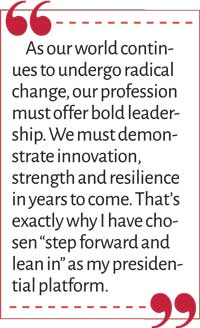
We need to help others grow – We have a collective responsibility to attract and help others grow in the profession through volunteering, mentoring and inspiring the next generation to join the profession. Whether we’re talking to young people about their careers, volunteering, mentoring students or coaching talent — all these things collectively add up to make an impact.
We need to foster diversity, equity and inclusion (DEI) – To unlock growth and prosperity, we need to seek out, enable and develop the best and brightest, regardless of gender, ethnicity, belief, geographical dispersion, or social-economic background. Prioritising DEI and maintaining accountability is critical to help our profession, businesses, and economies to grow and thus broaden prosperity.
Q: As the 89th President of this coveted forum, how would you bring in Sri Lankan innovation, Sri Lankan strength and resilience to your new role?
A: As our world continues to undergo radical change, our profession must offer bold leadership. We must demonstrate innovation, strength and resilience in years to come. That’s exactly why I have chosen “step forward and lean in” as my presidential platform.
Now is the time to lean in and embrace that courage to step forward. To maintain our momentum. To never relent in disruption. To find opportunities for growth. And to go beyond the current crisis to claim our leadership role for the future.
If our accomplishments of the last two and a half years are anything to go by, I think we’re up to the challenge.
Q: As an experienced accounting and finance professional and as the Finance and Administration Lead of the World Bank SL and Maldives, how would you define South Asia’s potential on the global stage?
A: I can only speak in my role as CIMA President. However, this gives me great insight into the accounting profession and how it works to drive solutions and support economic recovery.
Like many parts of the world, South Asia’s growth will be slower than previously projected due to rising inflation, supply chain disruptions, and geopolitical instability.
In this context, businesses in South Asia must take steps that will enable them to adapt and thrive, including:
Accelerating their transformation in key areas (digital, personnel, workplaces).
Updating their corporate strategies to address uncertainty.
Implementing quick response strategies for potential disruptions.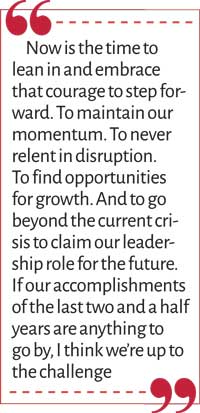
Increasing overall business resilience.
Operating in an iterative way of learning and relearning what works to get the best results in uncertain times.
The region has great potential to shine on the global stage. However, to survive beyond the near-term, businesses in South Asia must become more resilient, invest in new ways of doing business, and rethink how they can create value — not just in reaction to the current issues, but in preparation for whatever comes next.
Q: The latest UN Report on Women in the workforce which was launched a few months ago reveals that despite the fact that Sri Lankan women’s investment in their secondary education is much higher than their male counterparts, it is not translated when it comes to the workforce, given that many women give up work owing to family commitments and other red tape. What are your thoughts and proposals in harnessing more Sri Lankan women to participate in the workforce?
A: The global and national challenges of the past few years highlighted the balancing act that women have performed for years managing their work and family lives. Organisations must recognise the challenges women face in their career progression and put practices into place to support their success.
I believe that there are three things that businesses can do to provide greater gender equality:
Be flexible: To help women balance family, organisations must think outside the box for equitable and realistic solutions, such as home-based work arrangements, flexible work hours or split days.
Set SMART goals: Setting SMART (Specific, Measurable, Attainable, Relevant and Timely) goals is a tried-and-true way to move from ideation to concrete results, and measure success.
Be more inclusive: Businesses must actively develop strategies and actions designed to attract, hire and retain women and provide them with the tools, resources and pathways to grow.
Q:In a backdrop such as this how would you see CIMA qualification enabling Sri Lankan women more opportunities to become partners in the workforce encouraging work-life balance?
A: We know that the pandemic has impacted progress on DEI initiatives. Diverse employees – including women – have had to face some difficult challenges, both in their professional and personal lives. 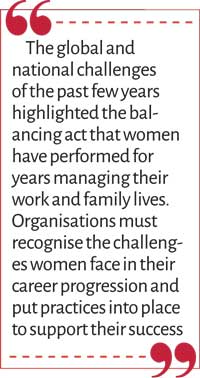
It’s now time to change the narrative by ensuring that we continue to advance DEI and empower all employees in the workplace. By tapping into different people, cultures and perspectives, our profession will be in a better position to solve even the most complex and challenging issues.
As an organisation, our mission is to drive a dynamic accounting profession full of opportunities accessible to everyone. In recent years, we have notably expanded our DEI learning portfolio, promoted the leadership of women through our flagship ENGAGE conferences and Women’s Global Leadership Summits, created dedicated networks to support women, and offered financial assistance to members who are in temporary financial need due to hardship.
To succeed, we must not only focus on our skill sets, but also on fostering an inclusive accounting and finance profession at every level – it’s everyone’s responsibility.
Q:You also emphasised in your remarks following your acceptance of the Presidency that ‘innovative solutions’ are important in this profession. Be it chartered accountants or otherwise, how vital do you think it is for Sri Lankan professionals to play a more innovative social role going beyond their professional mandate especially at a time like this?
A: Being a volunteer has lots of benefits. It can enable you to learn new skills, meet new people, and build your confidence while making a positive impact on the communities around you.
At CIMA and the Association, volunteers are at the heartbeat of our organisations, influencing the future of the profession and our strategy. Today we have over 2,000+ annual volunteers in 200+ groups serving at all levels, from our local area committees up to our Board of Directors.
I have myself volunteered with many organisations, including CIMA, the Association, my local church, the executive committee of my Alma mater Bishop’s College and the Sri Lanka Family Planning Association. I’d highly encourage others to do the same if they can.
Q: Despite the fact that Sri Lankan skill is second to none in the world, it is often not tapped to bring out the best. As a professional who is very vocal about skills, how do you propose that this skill is taken to the next level in terms of upskilling and reskilling? How important are public-private partnerships in this process?
A: In face of one of the biggest economic crises in decades, we must invest in skills to help generate economic growth and help the country overcome current challenges. Today’s world requires individuals to constantly learn, unlearn and relearn.
To achieve this, we must better support all workers to reskill and upskill throughout their working lives and encourage them to now start adapting their skillsets, whether they choose conventional or vocational pathways.
This will not happen overnight. It will require a concerted effort from both the public and private sector to ensure that we equip our workforce with the skills they need to succeed now and in the future.
Q: In what ways do you think our education system demands a complete revamp to cater to the demands of the modern world of work?
A: All governments around the world are looking to address how to reskill and upskill their economies for a digital and more sustainable world.
In addition to governments playing their role, professional associations like ours play a critical role in providing career paths and supporting lifelong learning, upskilling and continuous professional development to enable economies to grow.
We’ve been empowering our members to take their organisations beyond expectations for over 100 years. We’re committed to help them reach their full potential:
We regularly update our qualifications, release new thought leadership, courses, events and other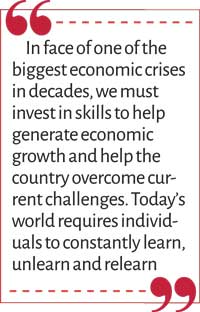 learning resources to equip them with the skills required by businesses.
learning resources to equip them with the skills required by businesses.
We provide them with a suite of CPD opportunities to enable them to choose activities, which best support their professional needs and career development.
Through the Association of International Certified Professional Accountants, representing AICPA and CIMA, we also have strong local member networks and offices across 196 countries dedicated to supporting our members’ professional needs.
Knowledge is a perishable good, so it’s crucial that we all commit to learn, unlearn and relearn to stay relevant throughout our careers.
Q:Today many talented Sri Lankan professionals are seeking greener pastures abroad, leading to a mighty brain drain. What’s your message to those who are contemplating leaving the country?
A: Having had the opportunity to study and work abroad myself, I believe it can provide valuable experience for professionals in any sector. From increasing your cultural awareness to expanding your professional network, there are plenty of benefits to studying, working and living abroad and then returning to your homeland.
The good news is that undertaking CIMA’s professional qualification gives you options both home and abroad. The fact that the program is a global standard means that our members and students are set up to succeed whether they stay or spend time abroad. We also make sure that our members, regardless of where they are in the world, have access to the very best thought leadership, courses and training.
Q: What are the values which helped you through this long journey and achieve what you’ve achieved?
A:
Resilience, Persistence and Tenacity – I’ve always been able to bounce back from challenges and setbacks in life, to adapt and grow as a person and a professional. Resilience and persistence have been the key to this, which I’ve held for a long time. Citing an example from my school days, I swam the two-mile sea swim in the unknown ocean waters in Ambalangoda. At the time, this was a trailblazing event for female swimmers as there wasn’t a formal swim event for women back then. It was my tenacity and grit that paved the way for the subsequent two-mile sea swim events for women in Ambalangoda.
Discipline – Throughout my life, I’ve always set myself goals of where I wanted to be. Having the ability to effectively lead myself to achieve those goals was all down to my self-discipline. As an active person, I believe a healthy mind goes alongside a healthy body and I find ways to do some exercise every day, which helps keep me focused.
Collaboration – I strongly believe that the future belongs to those who work with, not against, each other and, in the process, learn from one another. To succeed both in our professional and personal lives, we must build meaningful connections. It’s all about networking, collaboration, supporting one another to rise and grow.
Q: Share your flipside – your other interests and a little bit about your personal passions.
A: Well, my other interests are rather varied. In my early days as a young schoolgirl, I was very passionate about swimming and competed in many national competitions in Sri Lanka. To this day, I remain very passionate about swimming and water-based sports particularly waterskiing. I also take a great interest in badminton as a recreation sport.
Outside of this, I have a keen interest in classical music, diverse cultures and travel. I believe these are great ways to enrich your mind and expand your horizons.
Finally, I also serve on the national council of the Family Planning Association of Sri Lanka and am involved in my local church – Christ Church, Galle Face. These are all great ways of being involved with my local community and giving back to society in a meaningful way
Q:What would you like to share with the young professionals aspiring to reach the heights you have achieved?
A: Find your passion – have a passion for what you do. ”Passion is critical” in all that we do and keeping your passion alive can conquer many dreams.
Know your purpose – be principled and ethical in whatever you do and develop the trust of those around you.
Have unwavering commitment – dream big believing in yourself and never fear failure.